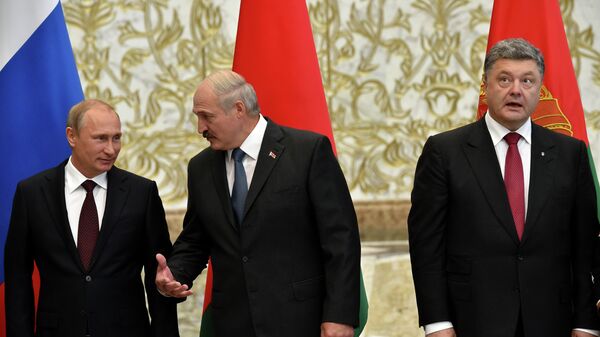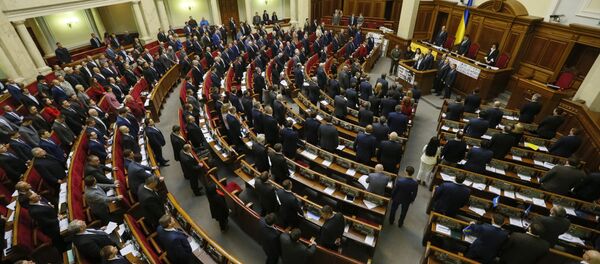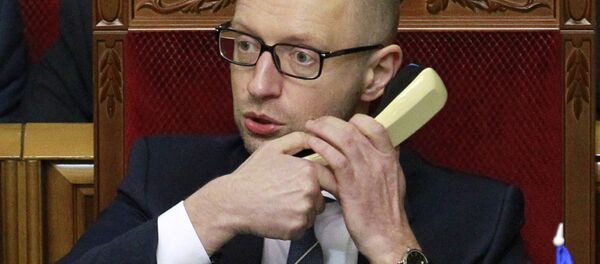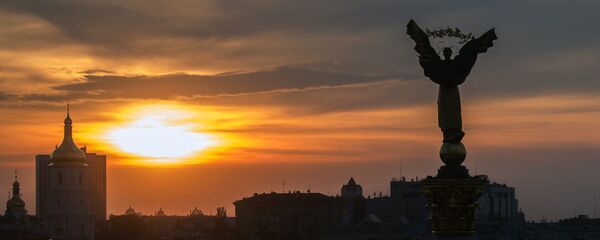Despite the dramatic worsening in diplomatic relations, Kiev has refused to abrogate the 1997 Russian-Ukrainian Treaty on Friendship, Cooperation and Partnership, which served as a border and security treaty, and enshrined the principle of strategic cooperation between the two countries. The treaty, extended in 2008, allows either party to withdraw from the treaty after informing the other party of its intention to do so.
Speaking at a press conference in Kiev on Friday, Mikhail Pogrebinsky, a prominent Ukrainian political scientist and the head of the Kiev Center for Political and Conflict Studies, pointed out the legal and political paradox of the current situation, and suggested that it was an indication that Ukraine, no matter how combative its rhetoric may get, has no intention of denouncing the treaty which lays at the basis of its diplomatic relations with its eastern neighbor.
"Overall, for me all this looks rather strange…It's impossible for the law to simultaneously recognize Russia as an aggressor and for an international treaty according to which Russia is a strategic partner, a friend, a brother nation, etc. to continue to function. Why hasn't it been denounced? Because the treaty includes commitments and provides for the recognition of borders. Therefore, [Kiev] doesn't really feel like denouncing it," Pogrebinsky said.
"A paradox exists which is even more ridiculous," the analyst noted. "Ukraine's parliament has adopted a law which says that part of the territory of Donbass is occupied. But this is the first case in global law where the fact of occupation is stated, but the occupant country is not specified; in the text of the law, Russia is simply not mentioned," despite the fact that in the past, Ukrainian authorities have repeatedly accused Moscow of sending thousands or even tens of thousands of troops to eastern Ukraine, without providing evidence to back up their claims.
Moreover, Shpunt noted, for all his faults, Ukrainian President Petro Poroshenko is at least a pragmatist, and is "not prone to tearing his shirt from his chest. He understands perfectly well that a complete rupture in relations with Russia would result in Ukraine falling into an economic abyss from which it would never recover. Ukraine has already felt the serious consequences of the break in economic ties with Russia, and a complete break, as I've said, is capable of leading the country to total collapse."
Therefore, Shpunt suggests, in an attempt to ensure his political survival, "Poroshenko is trying to sit on two chairs at once: on the one hand condemning Russia as an 'aggressor', and on the other – not terminating the Treaty on Friendship, Cooperation and Partnership."
For his part, Alexei Martynov, the director of the International Institutes for New States, told Svobodnaya Pressa that unfortunately, "the whole of the legal aspect of Ukrainian statehood was built on uninterrupted legal conflicts."
"It is believed that most of the connections, including economic ones, between Russia and Ukraine have [already been] torn, at Kiev's behest. However, if we look at relations between the two countries on the whole, we will find that the vast majority of ties actually remain in place. Abandoning all forms of cooperation is something Ukraine cannot do even in principle. Russia, of course, would also not like to see such a turn of events, but we will survive. For Ukraine, on the other hand, [such a step] would simply be disastrous."
In any case, Martynov noted, there is no chance that Moscow will abandon the treaty. "We will not do so. Unlike our Ukrainian brothers, we are capable of looking at the situation from above any immediate grievances we may have."








